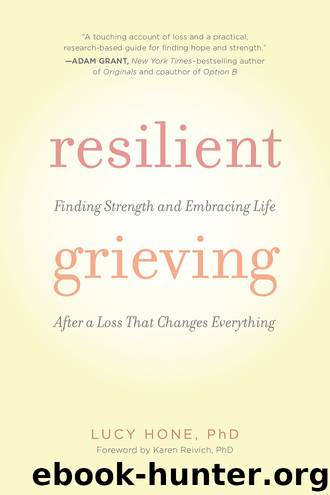Resilient Grieving by Lucy Hone

Author:Lucy Hone
Language: eng
Format: epub
Publisher: The Experiment
Published: 2017-03-09T05:00:00+00:00
Chapter 10
Relationships (and what friends and family can do to help)
AS HUMANS WE ARE hardwired for relationships, for connection with others.
Years ago, I was watching the TV show Touch and was sufficiently struck by the following words to rewind and write them down: “Human beings are not the strongest species on the planet, not the fastest or the smartest. The one advantage we have is our ability to cooperate, to help each other out. We recognize ourselves in each other, we are programmed for compassion, for heroism, for love. And those things make us stronger, faster, and smarter; that’s why we survive.”
In grief, as in so many aspects of our lives (and particularly times of traumatic and adverse events), our relationships with others are vital. A large body of research has accumulated over the past three decades to indicate how important supportive relationships are for resilience. Numerous studies have shown that social support reduces psychological distress in the aftermath of trauma. For example, children who have best survived child poverty or abuse have usually done so because they found a supportive adult to help them through,1 and adults exposed to trauma such as natural disaster, war, and assault fare better if they are well supported.2 Similarly, several studies have shown that people with strong social support networks are more unlikely to become depressed than those without such networks. Having even one supportive confidant reduced the risk of depression in half the research subjects following other painful events such as divorce or job loss.
SOCIAL SUPPORT REDUCES PSYCHOLOGICAL DISTRESS IN THE AFTERMATH OF TRAUMA.
Researchers at the Center on the Developing Child at Harvard University had this to say about resilience: “There is no “resilience gene” that determines the life course of an individual irrespective of the experiences that shape genetic expression. The capacity to adapt and thrive despite adversity develops through the interaction of supportive relationships, gene expression, and adaptive biological systems. Despite the widespread belief that individual grit, extraordinary self-reliance, or some inborn, heroic strength of character can triumph over calamity, science now tells us that it is the reliable presence of at least one supportive relationship and multiple opportunities for developing effective coping skills that are the essential building blocks for the capacity to do well in the face of significant adversity.”3
As we have seen in Chapter 3, Charney and Southwick’s interviews with American soldiers imprisoned during the Vietnam War reached the same conclusion. Very few individuals who have managed to demonstrate resilience in the face of trauma have done so alone. “You get enormous emotional strength from relationships and organizations such as MADD [Mothers Against Drunk Driving]. We know lots of advocacy organizations that help patients face cancer—these are incredibly important social networks that can be a safety net during times of stress.” 4
A growing number of studies have indicated the importance of social support for successful grieving specifically. Even more sophisticated research methods have shown that certain types of social support are more useful to the bereaved than others.
Download
This site does not store any files on its server. We only index and link to content provided by other sites. Please contact the content providers to delete copyright contents if any and email us, we'll remove relevant links or contents immediately.
They Both Die at the End by Adam Silvera(9818)
Thirteen Reasons Why by Jay Asher(8909)
The Space Between by Michelle L. Teichman(6939)
Suicide Notes by Michael Thomas Ford(4827)
Tuesdays with Morrie by Mitch Albom(4784)
Suicide: A Study in Sociology by Emile Durkheim(3022)
The Checklist Manifesto by Atul Gawande(2852)
Tuesdays With Morrie by Mitch Albom(2762)
In the Woods by Tana French(2598)
Bossypants by Tina Fey(2532)
Robin by Dave Itzkoff(2440)
Olive Kitteridge by Elizabeth Strout(2371)
No Ashes in the Fire by Darnell L Moore(2333)
Reservoir 13 by Jon McGregor(2302)
End of Days by Sylvia Browne(2187)
All Things New by John Eldredge(2162)
Bus on Jaffa Road by Mike Kelly(2159)
Scar Tissue by Anthony Kiedis(2135)
No Time to Say Goodbye(2116)
